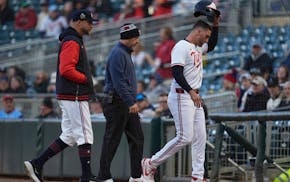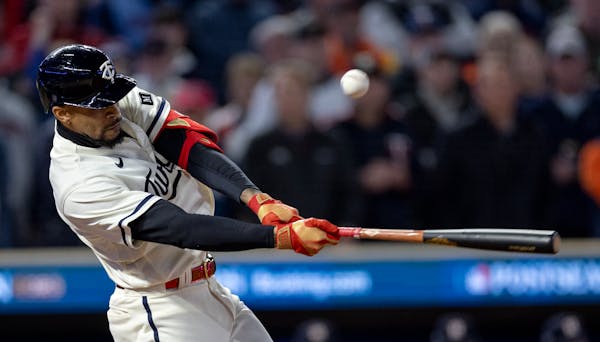The Twins' season is over because their postseason struggles on offense were real. Not because of bad luck (nonfactor). Not because of poor pitching (there was some of that). The offseason is here now because they had just three hits on Tuesday and only three more on Wednesday.
Houston is off to its seventh consecutive American League Championship Series after edging the Twins lineup during a 3-2 victory on Wednesday to take the AL Division Series. After the Twins won Game 2 to even the series at a game apiece, the odds were in their favor of moving on to the next round. According to MLB.com, when a Division Series with a 2-2-1 format is tied after Game 2, the team hosting Games 3 and 4 has won the series 67% of the time.
That would require the Twins to outscore the Astros. That was too much to expect, apparently.
The highlight of the series was their 6-2 victory in Game 2 over Houston stud lefthander Framber Valdez. The Astros' next two starters were righthander Cristian Javier in Game 3 and righthander José Urquidy in Game 4. There was a clear path to the ALCS.
After averaging 6.25 runs over 28 games in September, we were led to believe that Twins hitters were surging at the right time. That the arrival of Royce Lewis, a healthier Carlos Correa, the evolution of youngsters like Edouard Julien and Matt Wallner and an effective group of role players would create an October-ready offense.
Wrong.
It's difficult to determine which game was more annoying. In Game 3, the Twins drew seven walks, so they were doing something right by working the count. Just touch the ball when there's a runner on third base with less than two outs, and you score. And maybe Game 3 doesn't get away from them if they score early against Javier.
Game 4 began ominously when Julien doubled to lead off the first but was erased on Jorge Polanco's soft liner that was caught by shortstop Jeremy Peña, who dived to tag Julien as he attempted to retreat to second. Lewis followed with a home run, and the Twins led 1-0 instead of 2-0. Urquidy then retired 14 of the next 15 batters, striking out five in a row at one point. This is the same Urquidy that was 1-1 with a 5.35 ERA over his final 10 outings of the regular season — six as a reliever. He looked like Pablo López on Wednesday.
"He changed speeds," Twins manager Rocco Baldelli said. "He used the slower breaking ball. He used the changeup. He did some different things. He had more on his fastball today than I think we were anticipating, if the numbers on the board are right, which I think they are. He had some very good life on that pitch, and the velo was also seemingly a little up as well."
The announced crowd of 40,977 went from raucous to repulsed as the Twins were unable to adjust and put runners on base. They were 0-for-1 with runners in scoring position — the one at-bat was Polanco's lineout in the first. After Julien's homer in the sixth, the Twins had one baserunner the rest of the game.
Astros righthander Hector Neris has one of the best arms of any reliever in baseball, but Carlos Correa centered one of his sinkers in the seventh inning for a 108.5 miles per hour rocket — the hardest-hit ball of the game. And right at Peña for an out.
Correa returned to the home dugout, banged his helmet twice on the bench then slammed his bat down. His frustration reflected the travails of the Twins offense on Wednesday and throughout most of their Division Series against the Astros. He wasn't the only one emotional, as the normally stone-faced Max Kepler let home plate umpire Jansen Visconti have it after a called strike three ended the game.
"Offensively it didn't feel like we probably settled in and had the at-bats we had for most of the year — most of the second half at least," Baldelli said.
Time to settle into the offseason.

Neal: Another season begins at Canterbury Park with Minnesota's sports betting future in limbo

Neal: Success of Bueckers, Holmgren, Minn. franchises emblematic of this 'State of Basketball'
Twins-Guardians game called after two rain delays, will resume Tuesday

Neal: It rains bats and dogs for McCusker's home debut with Twins


